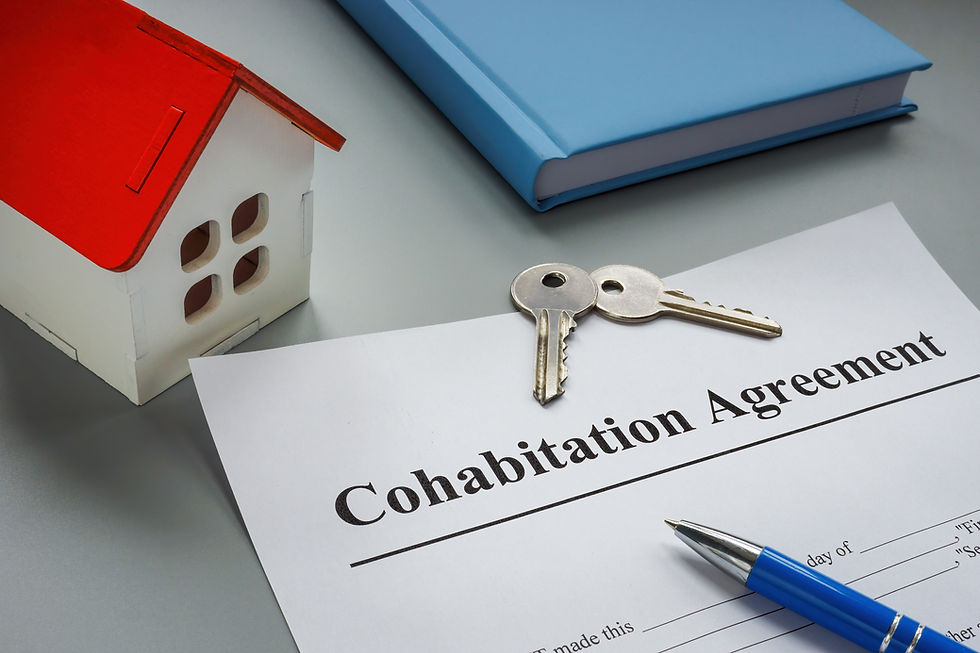RIGHTS OF GRANDPARENTS TO CONTACT/CARE TO THEIR GRANDCHILDREN AFTER A DIVORCE
- administration9514
- Jun 6, 2021
- 7 min read
What can grandparents do when they are refused to have contact with their grandchildren?
The Children's Act introduced the concept "parental responsibilities and rights" to replace the outdated concepts of "parental authority" and "parental power". Parental responsibilities and rights can be, and usually are, shared. However, shared responsibilities and rights do not equate to what used to be called "joint custody". It indicates that several people can have parental responsibilities and rights with regard to a specific child and that they can either have full or specific parental responsibilities and rights.
Parental responsibilities and rights include:
(a) to care for the child;
(b) to maintain contact with the child;
(c) to act as guardian of the child; and
(d) to contribute to the maintenance of the child.
A parent or other person who acts as guardian of a child must administer and safeguard the child's property and property interests and assist or represent the child in administrative, contractual, and other legal matters. Furthermore, the Children's Act allows any person to be granted parental responsibilities and rights in respect of a child. Co-holders of parental responsibilities and rights exercise their responsibilities and rights independently and without each other's consent. The only exceptions to this rule are when consent is required for (a) the child's marriage; (b) the child's adoption; (c) the child's departure or removal from the Republic; (d) the child's application for a passport; and (e) the alienation or encumbrance of immovable property belonging to the child.
Section 23 of the Children’s Act covers assignment of contact and care to interested persons (which will include grandparents) by an order of the court. Section 23(1) provides that any person having an interest in the care, well-being or development of a child may apply to the High Court, a divorce court in divorce matters or the children’s court for an order granting to the applicant, on such conditions as the court may deem necessary:
(a) contact with the child; or
(b) care of the child.
Section 23 (2) goes on to say when considering an application contemplated in subsection (1), the court must consider:
(a) the best interests of the child;
(b) the relationship between the applicant and the child, and any other relevant person and the child;
(c) the degree of commitment that the applicant has shown towards the child;
(d) the extent to which the applicant has contributed towards expenses in connection with the birth and maintenance of the child; and
(e) any other fact that should, in the opinion of the court, be considered.
‘If the court is convinced that this is in the child’s best interests, it may award access to a third party who does not have an inherent right of access, such as grandparents or siblings of that child’. It does so in its capacity as upper guardian of all minor children. A court also has the power to deny contact if it is in the best interests of the child.
Because of the need to include evidentiary matter, careful planning and consideration is often more important in the preparation of a founding affidavit than it is for a particulars of claim hence it is advisable to consult a divorce attorney when parties want to launch an application for issues relating to contact, care and maintenance for children to ensure that the correct court is approached and that a cause of action is disclosed. The cause of action, in a strict and technical sense, refers to those elements which at law entitle a party (an applicant in an application or plaintiff in an action) to the substantive relief. In addition to the cause of action, the sworn statement used in support of an application must allege the correct facts to support the case comprising of admissible evidence. While the objective is to restrict the extent of the data placed before the court, it is not an infrequent occurrence that litigants resort to providing more detail than is required.
It should be taken note of that there is a difference between an order for care and an order for contact.
CARE
Section 1 of the Children’s Act defines “care” as providing the child with a suitable place to live, proper living conditions, financial support and protecting the child from abuse or harm. For a third party to get care for a child is more difficult than getting contact. This is because the courts are reluctant to interfere and will only do so if the parent providing the child with care is not performing his or her responsibilities properly.
The best interests of the child are of paramount importance when these applications are considered. In the B v M (2006) 3 SA 109 (W) case, the court held that the best interests of the child are the pre-eminent consideration but should not be the only factor. The best interests of the child are the paramount consideration in ‘a hierarchy or concatenation of factors’. The courts are not bound by the contentions of the parties; while establishing what is in the child’s best interests, they are entitled to call evidence in their own accord. Each case must be decided on its own facts and the dicta (statements) of judges in previous decisions should not be elevated to legal rules.
Care of child by person not holding parental responsibilities and rights.
Section 32 of the Children’s Act covers the care of a child by a person not holding parental responsibilities. Section 32 (1) provides that a person who has no parental responsibilities and rights in respect of a child but who voluntarily cares for the child either indefinitely, temporarily, or partially, including a caregiver who otherwise has no parental responsibilities and rights in respect of a child, must, whilst the child is in that person’s care:
(a) safeguard the child‘s health, well-being, and development; and
(b) protect the child from maltreatment, abuse, neglect, degradation, discrimination, exploitation, and any other physical, emotional, or mental harm or hazards.
CONTACT
“Contact” on the other hand refers to maintaining a personal relationship with the child, entitling a person to see, spend time with (visit or be visited) or communicate (through post, by telephone or any form of electronic communication) with a child who does not live with that person.
When decisions are being made in court about the care or contact of a minor child, the child’s views or opinions must also be put into consideration with due regard to his or her age, degree of maturity and level of development.
What happens if the custodian parent/s refuse contact after a court order in respect of such contact was obtained?
It is a criminal offence for the parent/s to unreasonably refuse or prevent another person, in this case the grandparents of the minor child, from having contact with the child if an order exists or if the custodian parent/s do not advise the other person in writing of any change of his/her residential address.
The aggrieved person (the grandparent or any other third party) may seek relief from the courts. In terms of the common law, the following remedies are available:
a) Interdict
A party (the grandparent in this case) can apply for an interdict to prevent or end a threat of interference with his or her exercise of care or contact.
b) Mandamus
In cases where the interference has already occurred, the court may order the interfering person to refrain from further interference or reinstate the state of affairs that existed previously. Moreover, it should be in the best interests of the child.
c) An order directing compliance.
If the custodian parents fail to comply with the terms of an existing court order regarding guardianship, care and contact, the court may issue an order directing compliance. Persons who wilfully and with bad faith exercise aspects of guardianship, care and contact in violation of an existing court order can be charged with contempt of court. Furthermore, any person who wilfully frustrates an order regarding guardianship, care or contact may also be charged. Courts will however not enforce orders that are not in the best interests of the child.
Statutory remedies
The Children’s Act also provides remedies for the enforcement of guardianship, care, and contact. Section 28 of the Children’s Act provides for an application for an order of termination, extension, suspension or restriction of parental responsibilities and rights to be brought before the court. Such applications may be brought by any person with an interest in the care and well-being of the child, a family advocate or representative, or by the child acting with leave of the court.
When considering such an application, the court must take the following into account:
(a) The best interest of the child;
(b) The relationship between the child and the person whose parental responsibilities and rights are being challenged;
(c) The degree of commitment that the person has shown towards the child; and
(d) Any other relevant fact that should in the court’s opinion be taken into account.
Section 35 of the Children’s Act creates two criminal offences in respect of frustrating or obstructing parental responsibilities and rights. Section 35 (1) provides that any person having care of a child who, contrary to a court order or parental responsibilities and rights agreement, refuses to allow another person who has a right of contact with that child to exercise such right, is guilty of an offence and liable on conviction to a fine or to imprisonment for a period not exceeding one year. Section 35 (2) further provides that any person having care of a child while another person has a right to have contact with that child, is obliged to give prompt written notification to the other person upon any change in his or her residential address. A person who fails to do so is guilty of an offence and liable on conviction to a fine or to imprisonment for a period not exceeding one year.
GUARDIANSHIP
When is a grandparent going to want guardianship and what can they do to become one?
In terms of section 18 (3) of the Children’s Act, ‘guardianship’ refers to administering and safeguarding the child’s property and property interests, assisting, or representing the child in administrative, contractual, and other legal matters, and giving or refusing any consent required by law. This includes consent to marriage, adoption, departure or removal from the Republic, application for a passport, and alienation or encumbrance of any immovable property of the child.
Guardianship can also be assigned by a court order. Section 24 of the Children’s Act provides that:
(1) Any person having an interest in the care, well-being and development of a child may apply to the High Court for an order granting guardianship of the child to the applicant.
(2) When considering an application contemplated in subsection (I), the court must consider;
(a) the best interests of the child;
(b) the relationship between the applicant and the child, and any other relevant person and the child; and
(c) any other fact that should, in the opinion of the court, be considered.
(3) In the event of a person applying for guardianship of a child that already has a guardian, the applicant must submit reasons as to why the child’s existing guardian is not suitable to have guardianship in respect of the child.
.png)



Comments